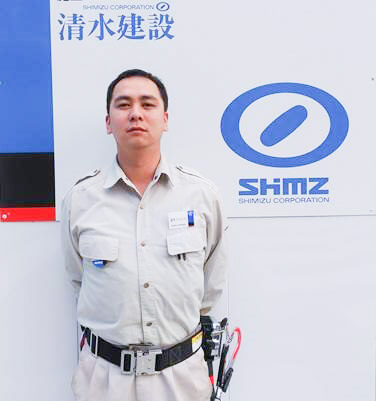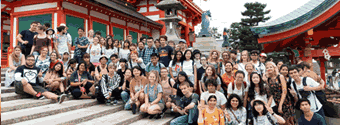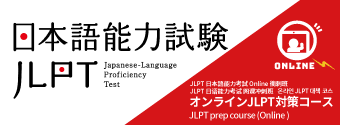Interview with Kudan graduate. Entrevista com Kudan graduado. Kenji (Brasil)
Category: After graduation, Contribution, Getting a job, Information

Kenji (Brasil)
- 自己紹介 Self-introduction Auto introdução
-
私の名前はケンジと申します。30歳、ブラジル、サンパウロ出身です。 私はブラジルのマッケンジー長老派大学のロースクールを卒業し、法律事務所で数年間働いた後、27歳で日本に来て九段で日本語を勉強しました。
(English)
My name is Raphael Kendi Suzuki, 30, from São Paulo, Brazil. I graduated in law school from Mackenzie Presbyterian University in Brazil and after some years working at law firms, came to Japan at the age of 27 to study Japanese at Kudan. (Portuguese)
(Portuguese)
Meu nome é Raphael Kendi Suzuki, 30, de São Paulo, Brasil. Eu me formei em Direito pela Universidade Presbiteriana Mackenzie no Brasil e depois de alguns anos trabalhando em escritórios de advocacia, vim para o Japão aos 27 anos para estudar japonês no Kudan Institute of Japanese Language & Culture.
- 就職までの日本語経歴 Japanese study history Histórico de estudo de língua japonesa até conseguir um emprego.
- 日本に移る前にブラジルで約6か月間日本語を勉強しましたが、コミュニケーションや日常会話は十分ではありませんでした。 九段日本語文化研究所で、基礎から1年間日本語を勉強し、卒業後1週間で清水建設で働き始めました。
(English)
I have studied Japanese for around six months in Brazil before moving to Japan, but it was not enough to communicate or have daily conversations. At Kudan Institute of Japanese Language & Culture, I studied Japanese for one year, from basics, and started working at Shimizu Corporation one week after graduation. (Portuguese)
(Portuguese)
Antes de me mudar para o Japão, estudei japonês por cerca de seis meses no Brasil, mas não foi tempo suficiente para conseguir me comunicar ou manter conversas do dia a dia. No Kudan Institute of Japanese Language & Culture, estudei japonês por um ano, do básico, e comecei a trabalhar na Shimizu Corporation uma semana após a formatura. - 私の夢 My dream・Meu sonho
-
夢とは言いませんが、目標としては、清水建設株式会社の国際営業部で働くことを目指しています(将来的には小さな庭を持ちたいです)。
(English)
I wouldn’t say a dream, but as a goal, I aim to work at Shimizu Corporation International Sales Department (and maybe, in the future, having a small garden). (Portuguese)
(Portuguese)
Eu não diria um sonho, mas, como objetivo, pretendo trabalhar no Departamento de Vendas Internacionais da Shimizu Corporation (e talvez, no futuro, ter um pequeno jardim). - 04.日本に来た理由。Reason to come to Japan. Motivo de vir para o Japão
-
最初は旅行できました。 私は日本に3週間(ほとんど東京と京都で)滞在しました。 その後、日本の美しさを忘れることなくブラジルに戻りました。 そこで、日本で暮らすためにはどうしたらいいか調べました。 そして、友人に九段を勧めてもらったので、仕事を辞めて日本に来る準備を始めました。
(English)
The first time was on vacation. I stayed in Japan for three weeks (mostly in Tokyo and Kyoto). After that, I went back to Brazil without being able to forget the beauties of Japan. So I started to study how could I move to Tokyo. And than a friend recommended me Kudan. Simplifying, I quit my job and started packing. (Portuguese)
(Portuguese)
A primeira vez foi de férias. Fiquei no Japão por três semanas (principalmente em Tóquio e Kyoto). Depois disso, voltei ao Brasil sem esquecer as belezas do Japão. Então comecei a estudar como me mudar para Tóquio. Então um amigo me recomendou a Kudan. Simplificando, larguei o emprego e comecei a fazer as malas.
- 九段日本語学院の勉強は? About Study in Kudan Japanese Institute? Sobre estudar em Kudan Japanese Institute?
-
九段で勉強できたことにとても感謝しています。学校のおかげで、日本での最初の1年間にたくさんの良い思い出を作りました。先生や他の事務員はとても親切で、私のニーズ(そして間違い)にとても気を配ってくれました。
私は会話コースで勉強しました。私の最も内気なクラスメートでも、内気な性格を改善するために、レッスン中に対話の練習に参加することを求められました(これはとても良かったと思います)。
私たちは毎日宿題をしていましたが、時には多くの時間を費やすこともありました。いつも助けてくれる先生がいて、授業後の疑問や質問に答えて頂いた事に感謝をしています(たとえ先生方が授業で学んでいない事だとしても)。
また、先生だけではなくすべての事務員は、定期券の作り方、日本で花見をする場合はどこに行くべきか、さらに、アルバイトを探すことなど、個人的な問題や質問にたくさん答えていただきました。
「会話コース」と名付けられているにもかかわらず、文法も勉強していました。ただし、漢字を勉強するには、「インテンシブコース」または特定のレッスンを受講する必要があります。
学校はまた、留学生と日本人ボランティアのミーティングなど、いくつかのイベントを開催しています。寿司や和菓子などの料理レッスン、そしていくつかの旅行にも行きました(私は修学旅行で行った富士Qハイランドが大好きでした)。(English)
I am very grateful to have been able to study in Kudan, and thanks to the school I made many good memories in my first year in Japan. The teachers and other employees were very nice and paid a lot of attention to my needs (and mistakes), so I still remember with care many smiles.
I attended the conversation course, and in order to improve, even my shyest classmates were forced to participate in dialogue practices during lessons (which, I believe, was very good).
We had homework every day and sometimes I needed a lot of time to finish it all. Hopefully, there were always teachers to help me and answers my doubts and questions after class (even when they were not exactly related to what we studied – thank you for that).
Also, not just the teachers, but all employees were always well disposed to help students with personal problems or questions, like explaining how to make a commuter pass, where you should go if you wanna see Japanese hanami, or even finding a part time job.
Despite being entitled “conversation course”, different of what some may think (it may be obvious but I heard this question from some people), we study grammar as well. However, to study kanji, you need to take the “intensive course” or specific lessons.
The school also organizes some events, like a meeting between international students and Japanese volunteers, occasion in which I made my first japanese friends; cooking lessons, like sushi or japanese sweets; and some trips (I loved the school trip to FujiQ). (Portuguese)
(Portuguese)
Sou muito grato pela oportunidade de ter estudado na Kudan e, graças à escola, fiz muitas boas lembranças no meu primeiro ano no Japão. Os professores e outros funcionários foram muito simpáticos e prestaram muita atenção às minhas necessidades (e erros), então ainda lembro com cuidado de muitos sorrisos.
Participei do curso de conversação e, buscando o aprimoramento de todos, até meus colegas mais tímidos eram coagidos a participar de práticas de diálogo durante as aulas (o que, acredito eu ter sido muito bom).
Tínhamos lição de casa todos os dias e às vezes eu acabava demorando muito tempo para terminar tudo. Felizmente, sempre haviam professores para me ajudar e responder às minhas dúvidas e perguntas após a aula (mesmo quando as minhas não eram exatamente relacionadas ao conteúdo estudado em sala – obrigado por isso).
Além disso, não apenas os professores, mas todos os funcionários estavam sempre dispostos a ajudar os alunos com problemas ou perguntas pessoais, como explicar como fazer um bilhete único; para onde ir se quiser ver habami ou até encontrar um emprego de meio período.
Apesar de ser intitulado “curso de conversação”, diferente do que alguns podem pensar (pode ser óbvio, mas eu ouvi essa pergunta de algumas pessoas), também estudamos gramática. Entretanto, para estudar kanji, você precisa fazer o “curso intensivo” ou lições específicas.
A escola também organiza alguns eventos, como encontros entre estudantes internacionais e voluntários japoneses, ocasião em que fiz meus primeiros amigos japoneses; aulas de culinária, como sushi ou doces japoneses; e alguns passeios (adorei a ir ao FujiQ). - 今はどんな仕事をしていますか?What is your job? What would you feel like your job? Qual é o seu trabalho?
-
現在、日本の建設会社である清水建設で働いています。
弁護士として、まず国際法務部で1年間働き、そこでは国際契約を扱いました。
現在、私は現場の事務所で働いていますが、将来的には部署が変更になる可能性があります(おそらく国でさえも)。(English)
Now I’m working at Shimizu Corporation, a japanese construction company.
As a lawyer, first I worked for one year at the international legal department, dealing mostly with international contracts.
Nowadays, I’m working in the administration office of a construction site. As it is common in japanese companies, I’ll probably change departments again in the future (maybe even country). (Portuguese)
(Portuguese)
Agora estou trabalhando na Shimizu Corporation, uma empresa de construção japonesa.
Como advogado, trabalhei por um ano no departamento jurídico internacional, lidando principalmente com contratos internacionais.
Atualmente, estou trabalhando com administração de obras. Como é comum em empresas japonesas, provavelmente mudarei de departamento novamente no futuro (talvez até país).
- 日本留学を考えているみなさんへ For everyone thinking to study abroad in Japan. Para todos os que pensam em trabalhar no Japão
- 日本で働くためには日本語能力は必須です。 ほとんどの人にとって、JLPT N2は仕事を得るための基本です。 また、英語や中国語などを話せる場合は、仕事の幅が広がるかもしれません。 しかし、これは日本企業向けです。 東京には多くの国際企業があり、中には日本語が堪能な従業員を必要としない企業もあります(ビジネスレベルは不要)。
しかし、日本で仕事をするには日本語を話せる事だけが重要なのではなく、日本の労働文化を理解することも必要です。これは特にアジア出身でない外国人にとっては少し難しいかもしれません。(English)
Japanese proficiency is a must for japanese companies. For most of them, JLPT N2 is fundamental to get a job. And if you can speak other languages (like English and Chinese), it may be a big differential. But this is for japanese companies. There are many international companies in Tokyo and some do not require japanese fluent employees (maybe intermediate level).
But fluency is not the only important requirement to get a job in Japan, it is also necessary to understand japanese working culture, and that may be hard specially to foreigners that are not from Asia. (Portuguese)
(Portuguese)
A proficiência em japonês é requisito básico para empresas japonesas. Para a maioria delas, o JLPT N2 é fundamental para conseguir um emprego. E se você pode falar outras línguas (como inglês e chinês), pode ser um grande diferencial. Mas isso é para empresas japonesas. Existem muitas empresas internacionais em Tóquio e algumas não exigem funcionários com japonês fluente (talvez de nível intermediário).
Mas a fluência não é o único requisito importante para conseguir um emprego no Japão, também é necessário entender a cultura de trabalho japonesa, e isso pode ser difícil, especialmente para estrangeiros que não são da Ásia.
More from my site
- Closed Student Visa applications for October 2025.
- Student visa| Kudan Japanese Institute Tokyo
- 受理結束2025年10月留學簽證申請。
- 留學簽證手續| 日本語學校、到東京留學的話、九段日本語學院就對了
タグ: English, Portuguese, 日本語
2019年11月18日 月曜日 5:47 PM Category: After graduation, Contribution, Getting a job, Information.

















